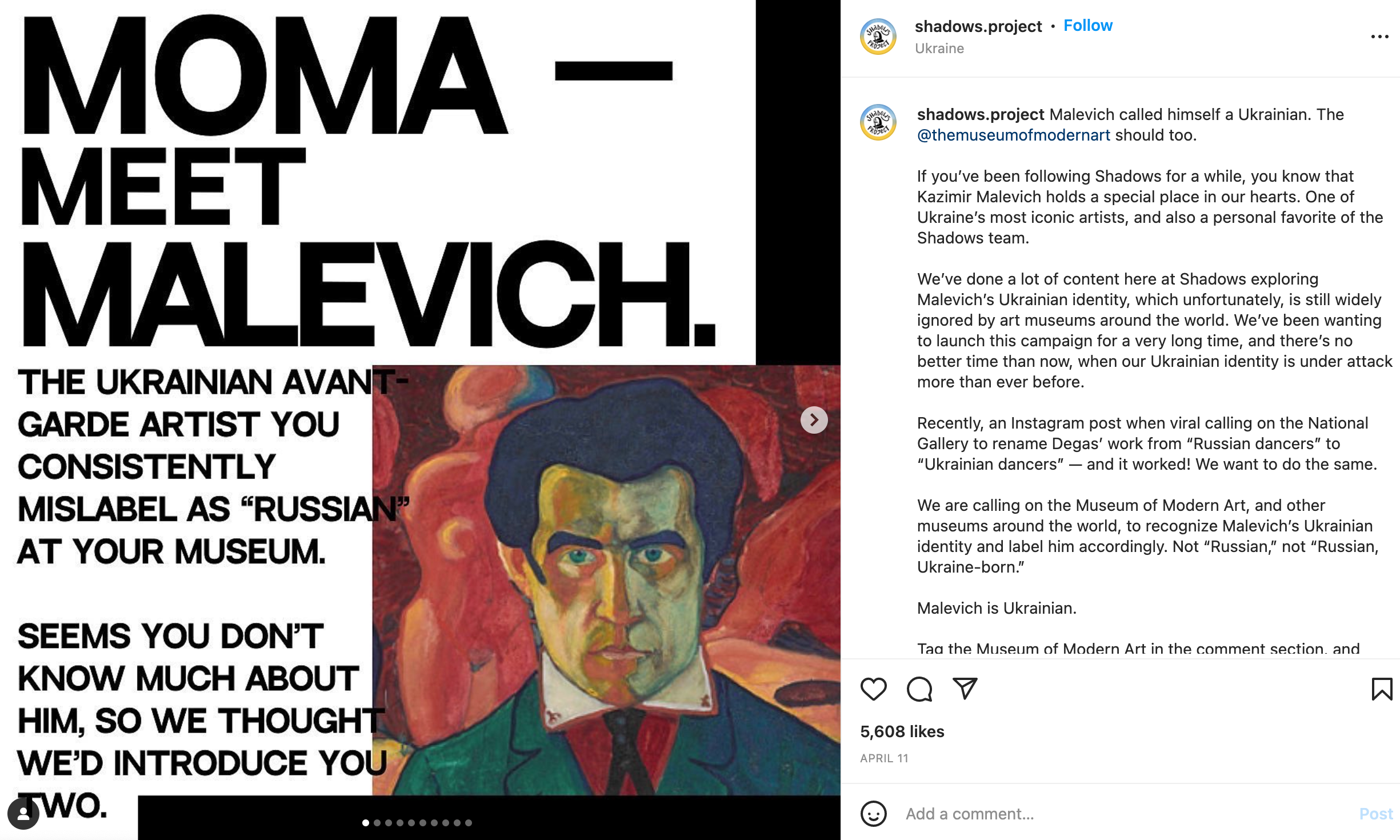The Shadow Project wants the Museum of Modern Art to publicly acknowledge that the famous avant-garde artist Kazimir Malevich was Ukrainian, not Russian Courtesy of The Shadows Project
The Russian leader Vladimir Putin has repeatedly denied Ukrainian sovereignty—declaring the very existence of an independent Ukraine a historical anomaly. Through a digital initiative called The Shadows Project, a group of Ukrainian students are fighting back against what they perceive as Putin’s “cultural assault”.
The group’s work is far-reaching. Initially established to advocate for Ukrainian traditions on social media, the team of volunteers have since helped Ukrainian cultural institutions secure crucial equipment and campaigned for international museums to recognise the Ukrainian heritage of the avant-garde artist Kazimir Malevich.
The idea for the project was first conceived in September 2020, when student Catarina Buchatskiy returned to Kyiv after a year-long absence. “I felt very drawn to Kyiv,” she says, “but I also felt like I was only seeing the tip of the iceberg, because so much of our history and our culture isn’t accessible to us due to historical oppression.”
For Buchatskiy, highlighting Ukrainian heritage and cultural history is a part of winning the war against Russia. She asks: “How can you defend a country if you don’t know what that country stands for?” The Shadows Project aims to tackle this dilemma head-on. “There are people out there who don't believe that Ukraine is a real state with a real identity. Unfortunately, we’ve been proven right in the worst way possible," she adds.
The primary goal of the project has always been to make culture accessible for the Ukrainian youth. Its Instagram page features fake Tinder profiles for Ukrainian authors and mock-up Vogue covers celebrating traditional Ukrainian dress.
The team is also currently in the process of building a digital encyclopaedia of Ukrainian history and culture. The collaborative project aims to offer young Ukrainians “the agency to explore and develop their own heritage”, says the project’s content manager Agatha Gorski.
In light of Russia’s invasion, the team’s priorities have shifted to physical, as well as digital, heritage protection. As such, their new Skrynia Cultural Heritage Program connects Ukrainian museums, including the Kyiv History Museum, with international donors in order to facilitate the supply of protective equipment for their collections. The student-led team bridges the language barrier, enabling Ukrainian cultural institutions to broadcast their specific needs.
In their first shipment to Ukraine, the team delivered 20 fireproof blankets, 13 fireproof cabinets, and two emergency generators—worth around $27,000.
With all eyes on Ukraine, the group has seized the opportunity to accelerate their campaign to recognise Ukrainian-born artists as Ukrainian—giving “credit where credit’s due”, says the co-executive Kvitka Perehinets.
Having celebrated the recent decision of London’s National Gallery to update the title of Edgar Degas’s Russian Dancers to Ukrainian Dancers, they hope to see similar changes replicated worldwide. Specifically, they are campaigning for museums to recognise the Ukrainian heritage of the artist Kazimir Malevich, known for his development of Suprematism and his famous 1915 painting Black Square.
This has long been Buchatskiy’s “personal cause”. After learning about Malevich at Stanford University, she became fascinated―and disturbed―by his legacy.
Malevich was born in 1876 in Kyiv, then part of the Russian Empire. In his personal diaries, as Buchatskiy points out, he repeatedly describes himself as Ukrainian. She says: “Seeing him mislabelled as ‘Russian’ drove me insane”.
Ultimately, she says, the suppression of Malevich’s Ukrainian heritage “shows how effective Russian propaganda is”. This does not, however, excuse the “wilful ignorance” of celebrated institutions, such as New York’s Museum of Modern Art—the primary target of the group’s campaign.
The Shadows Project seeks to use digital tools to resist Putin’s dismissal and destruction of Ukrainian heritage. “We have to remember that art and culture are weapons,” says Kvitka.

